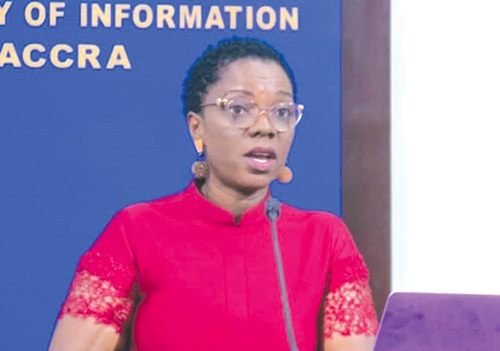World Health Organisation has designated April 25 as World Malaria Day
World Malaria Day 2025: A call to action against malaria

Over the years, the World Health Organisation (WHO) has designated April 25 as World Malaria Day, a global event aimed at raising awareness about this life-threatening disease.
This year’s theme: “Malaria Ends With Us: Reinvest, Reimagine, Reignite”, emphasises the need for collective action to combat malaria.
Current State of Malaria
There were an estimated 597,000 malaria deaths globally in 2023. Across the world, malaria cases reached 263 million in 2023, an increase of 11 million cases compared with 249 million cases in 2022.
Sub-Saharan Africa alone accounted for about 94 per cent of all cases and 95 per cent of all deaths. A total of 76 per cent of all deaths in this region were among children aged below five years in 2023, compared with 91 per cent in 2000.
Ghana has made significant progress regarding malaria control over the years. For instance, deaths due to malaria have reduced from 2,799 in 2012 to 151 in 2022.
Malaria prevalence has also declined from 27.5 per cent in 2011 to 8.6 per cent in 2022 while confirmed malaria cases per 1000 population has reduced from 192 in 2019 to 159 per 1000 in 2020. Despite these achievements, malaria remains a significant public health problem in Ghana.
Developed midway through the implementation of the National Malaria Strategic Plan 2021-2025, Ghana’s first National Malaria Elimination Strategic Plan birthed a paradigm change from control to elimination, shifting focus from burden reduction to disruption of malaria transmission.
Malaria prevalence
The Ghana Demographic and Health Survey 2022 showed a reduction in prevalence, recording a national prevalence reduction from 14.1 per cent in 2019 to 8.6 per cent in 2022, with the Greater Accra Region having the lowest prevalence of 2.0 per cent and the Oti Region having the highest of 15.0 per cent.
The economic burden of malaria arises from the costs associated with the delivery of interventions, income loss among infected individuals, effects on workforce time, productivity losses and potential declines in investment.
According to the National Malaria Elimination Programme (NMEP), efforts to control malaria in Ghana have included the distribution of insecticide-treated bed nets, indoor residual spraying of insecticides and the use of antimalarial medicines, among others.
However, the challenges in controlling and eliminating malaria in the country are complex and require a multifaceted approach that addresses the social, economic and environmental factors that contribute to the disease.
The NMEP, through its Programme Manager, Dr Keziah Malm, is making strides in sustaining evidence-based programming to achieve malaria elimination.
The goals of the National Malaria Elimination Strategic Plan (NMESP) 2024-2028 are to reduce malaria mortality by 90 per cent by the year 2028, reduce malaria case incidence by 50 per cent by 2028, using 2022 as a baseline, and eliminate malaria in 21 districts with very low malaria burden by 2028.
The 21 districts are namely the Ablekuma Central, Ablekuma North, Ablekuma West, Adenta, Ashaiman, Ayawaso Central, Ayawaso East, Ayawaso North, Ayawaso West, Ga Central, Ga East, Korle Klottey, Kpone Katamanso, Krowor, La Dade-Kotopon, La-Nkwantanang-Madina, Ledzokuku, Okaikwei North and Tema West municipalities, as well as the Accra and Tema metropolis.
Ghana’s malaria programme is integrated into all levels of the health care system and the programme intends to eliminate malaria through a progressive sub-national approach deploying a mix of malaria interventions tailored to local context.
The NMESP has eight strategic objectives that ensure 100 per cent of the population has adequate knowledge, attitudes, practices and requisite skills for malaria elimination by 2028.
It is also to ensure that 100 per cent of the population uses at least one malaria preventive measure, as well as ensure that 100 per cent of suspected malaria cases are tested by 2028.
It is also to ensure that 100 per cent of confirmed malaria cases are appropriately, effectively and completely treated by 2028, as well as strengthen malaria surveillance, monitoring and evaluation systems by 2028 and ensure timely and adequate supply of quality-assured malaria commodities to all service delivery points by 2028.
The strategic plan is also to strengthen and maintain capacity for governance and programme management to achieve programmatic objectives at all levels of the healthcare system towards malaria elimination by 2028, improve mobilisation of resources and efficiently use available resources towards malaria elimination.
Overall, malaria remains a significant public health and socio-economic problem in the country, and concerted efforts are needed to reduce the burden of the disease and improve the health and well-being of the population.
2025 theme
Working with the 2025 theme of reinvesting, reimaging and reigniting, the NMEP hopes to reinvest by protecting its achievements, unlocking new potentials and increasing funding from governments, donors and the private sector by supporting global initiatives such as the successful replenishment of the Global Fund and Gavi, the Vaccine Alliance, which are critical sources of financing malaria programmes and interventions in the country.
The programme also aims at reinvesting by encouraging domestic investment to boost local funding in the fight against malaria in the country.
The programme also hopes to invest in proven interventions by prioritising investments in World Health Organisation-recommended tools, such as insecticide-treated nets, indoor residual spraying and artemisinin-based combination therapies, to help reduce malaria cases and deaths in the country.
To reimagine, it hopes to use innovative strategies and tools to overcome the challenges posed by drug and insecticide resistance, and climate change, through data-driven strategies.
It also aims to accelerate innovation by investing in research and development to lead to the discovery of new and more effective antimalarial drugs, diagnostics, insecticides, vaccines and vector control methods.
It also aims to reimagine by unlocking new funding solutions by exploring and implementing innovative financing mechanisms that will help bridge resource gaps for malaria control.
It also wants to turn research into action by fostering collaboration between researchers, policymakers and programme implementers to rapidly translate research findings into real-world impact.
In the area of reignite, it is working at renewing the commitment to ending malaria, to reignite the fight against malaria by joining the ‘big push’ that is uniting the malaria community and turning commitments into action to help drive progress.
It is also working at stepping up political and financial commitments through shared responsibility and sustained funding from global partners to protect hard-won gains against malaria, as well as celebrate success and inspire action by sharing lessons learned and celebrating successes to encourage everyone to take action to end malaria.
It is also working at strengthening community action by equipping people with the information and resources they need to prevent, detect and treat malaria effectively to help reduce cases and deaths.
Conclusion
In conclusion, the NMEP says the “Malaria Ends With Us” campaign serves as a reminder that collective action is necessary to combat malaria.
By reinvesting in malaria control programmes, reimagining innovative strategies and tools, and reigniting the commitment to ending malaria, we are saying “we can accelerate progress towards a malaria-free world.
As we mark World Malaria Day 2025, let us unite to protect the gains made and work towards a future where malaria is no longer a threat to humanity”.



